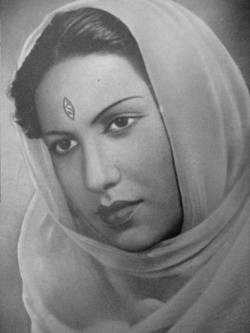Swaran Lata
| Swaran Lata | |
|---|---|
 Swaran Lata | |
| Born |
December 20, 1924 Rawalpindi, British Punjab (British India) |
| Died |
February 8, 2008 (aged 83) Lahore, West Punjab (Pakistan) |
| Other names | Saeeda Bano |
| Occupation | Actress |
| Years active | 1942–1971 |
| Spouse(s) | Nazir Ahmed |
Swaran Lata (Urdu: سورن لتا, Punjabi: ਸਵਰਨ ਲਤਾ) was a Pakistani film actress. She started her career in the film industry in British India and later moved to Pakistan. She was described as a 'Tragedy Queen' because of her emotional, tragic roles, her presence on screen and her moving dialogue delivery. She worked in Bollywood and in Pakistani cinema.
Early life
Swaran Lata was born into a Siyal Jatt Sikh family in Rawalpindi, British India on December 20, 1924.[1] She did her Senior Cambridge from Delhi and then joined the Academy of Music and Arts, Lucknow. In early 1940s, her family moved to Bombay.
Sawarn Lata later converted to Islam after she married Nazir Ahmed, a famous actor, director and producer at the time. She changed her name to Saeeda Bano. The Swaran-Nazir pair was a very creative ensemble, churning out many movies together both before and after Partition.
Career
An exceptional and wondrous story about how she entered the realm of acting trails Swaran. Her parents died when she was very young and she lived most of her adolescent life with her elder brother, whom she recalls "very strict". However, it is the story of how she got discovered that Swaran tells with great passion: "I was a student at college in Lucknow, India. When I was traveling from Delhi to Lucknow, a few directors saw me. They approached me to act in films but I was not interested at first. One of them then went to my elder brother with the offer, and to my utmost surprise he agreed".[2]
Swaran Lata started her career as a stage actress. Her first film was Awaaz released in 1942. Swaran and Nazir migrated to Pakistan at the time of the Partition of India in 1947. They left everything they had behind in Bombay and shifted to Lahore. The duo had to start from scratch and were part of the early Pakistani film industry.
Swaran Lata was heroine of Pakistan's first ever silver jubilee film Pherey. The film was a Punjabi film but she was an Urdu speaker who was trained in Lucknow, the home of Urdu littérateurs. For the film, she was coached in Punjabi language by Baba Alam Siahposh, a Punjabi poet, who was also one of the lyricists of the film songs.[3]
As heroine, Laarey, Naukar, Heer and as character actress Sawaal were her famous films. From 1960 onwards, she reduced her appearances and mainly shifted towards character roles.
In her lifetime, Swaran worked with great names like Prithviraj Kapoor and Motilal in India and with Santosh Kumar, Darpan, Inayat Hussain Bhatti and Habib in Pakistan.
Death
Swaran Lata died at the age of 83 in Lahore on February 8, 2008. She had four children, three daughters and a son.[4]
Filmography
- Awaaz (1942) Hindi film
- Tasveer (1943) Hindi film
- Pratigya (1943) Hindi film
- Ishara (1943) Hindi film
- Us Paar (1944) Hindi film
- Raunaq (1944) Hindi film
- Ratan (1944) Hindi film
- Ghar Ki Shobha (1944) Hindi film
- Preet (1945) Hindi film
- Laila Majnu (1945) Hindi film
- Pratima (1945) Hindi film
- Chand Tara (1945) Hindi film
- Wamaq Azra (1946) Hindi film
- Shaam Savera (1946) Hindi film
- Abida (1947) Hindi film
- Gharbar (1948) Hindi film
- Sachai (1949) Urdu film
- Pherey (1949) Punjabi film
- Anokhi Daastan (1950) Urdu film
- Laaray (1950) Punjabi film
- Bheegi Palken (1952) Urdu film
- Sheri Babu (1953) Punjabi film
- Khatoon (1955) Urdu film
- Naukar (1955) Urdu film
- Heer (1955) Punjabi film
- Sabira (1956) Urdu film
- Soteeli Maa (1956) Urdu film
- Noor-e-Islam (1957) Urdu film
- Shama (1959) Urdu film
- Billo Jee (1962) Punjabi film
- Azmat-e-Islam (1965) Urdu film
- Sawaal (1966) Urdu film
- Duniya Na Maney (1971) Urdu film
References
- ↑ http://www.flickr.com/photos/pimu/2251215887/
- ↑ http://www.dawn.com/weekly/images/archive/060611/images11.htm
- ↑ http://www.dailytimes.com.pk/default.asp?page=2008\02\14\story_14-2-2008_pg3_7
- ↑ http://www.dawn.com/weekly/images/archive/080217/images2.htm
External links
|